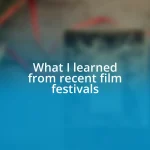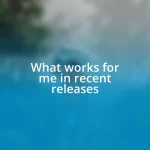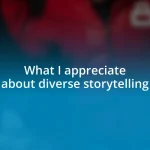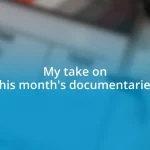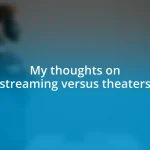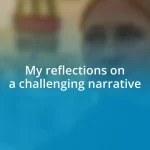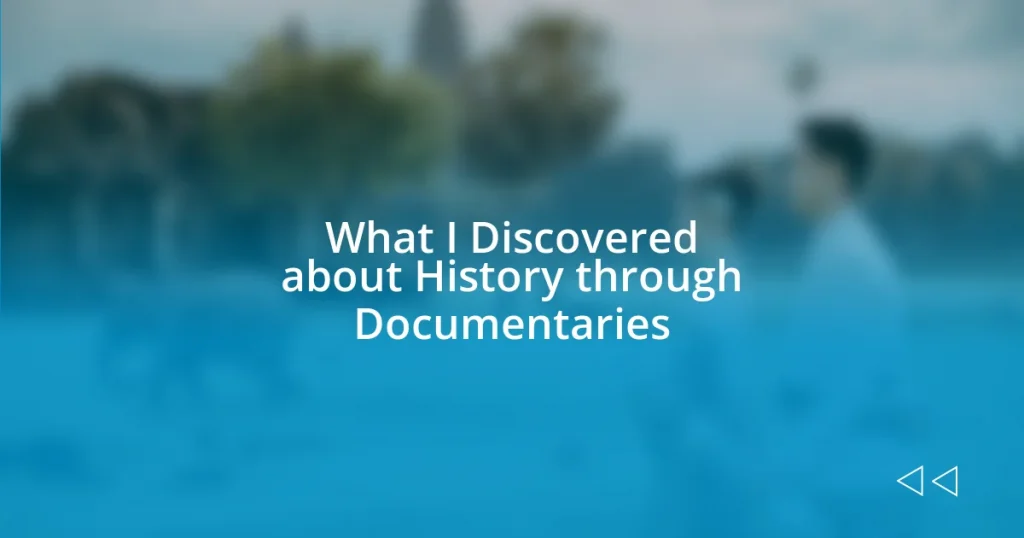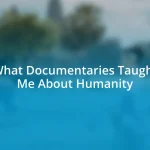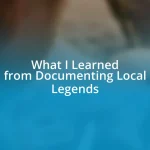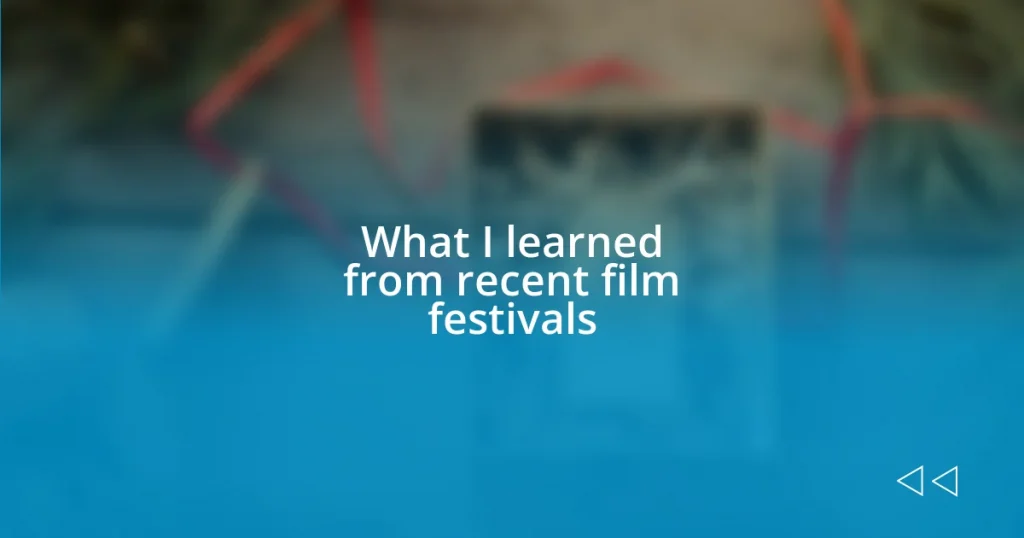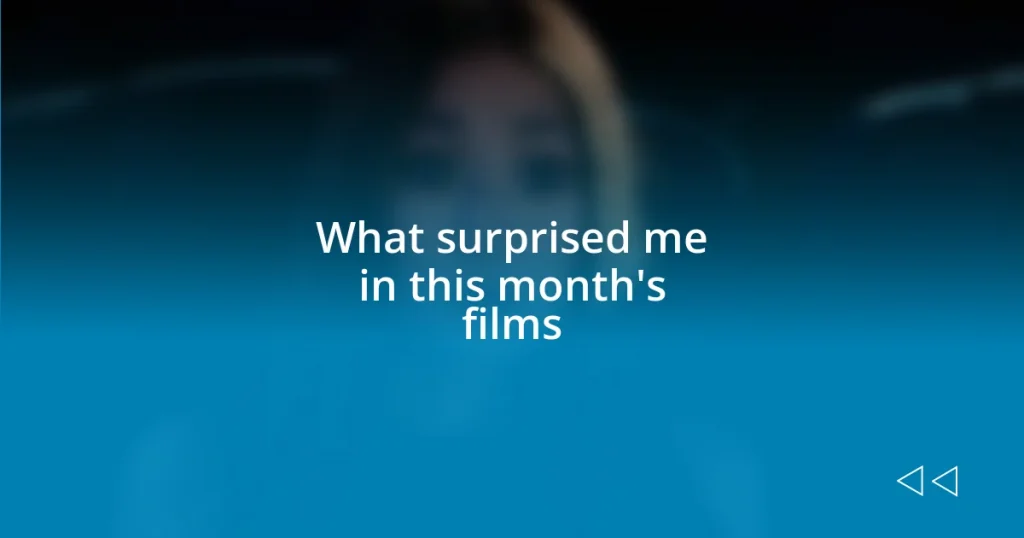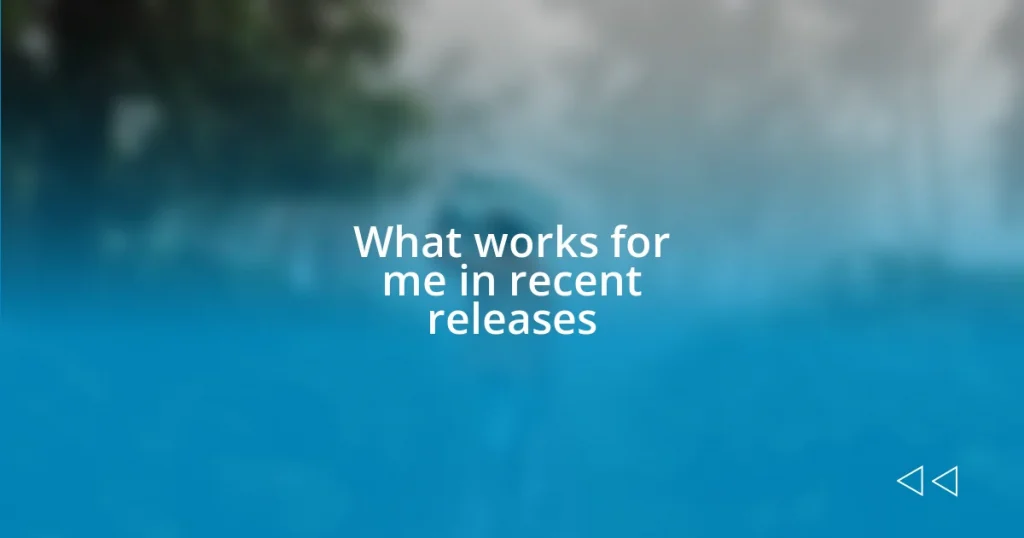Key takeaways:
- Documentaries provide a personal and emotional lens that deepens our understanding of historical events, often highlighting untold stories and broader social contexts.
- Key themes in history documentaries include personal narratives, social justice issues, and the impact of the past on present societal challenges.
- Viewing documentaries can inspire personal reflection and actionable changes, encouraging viewers to engage with social issues and historical injustices.
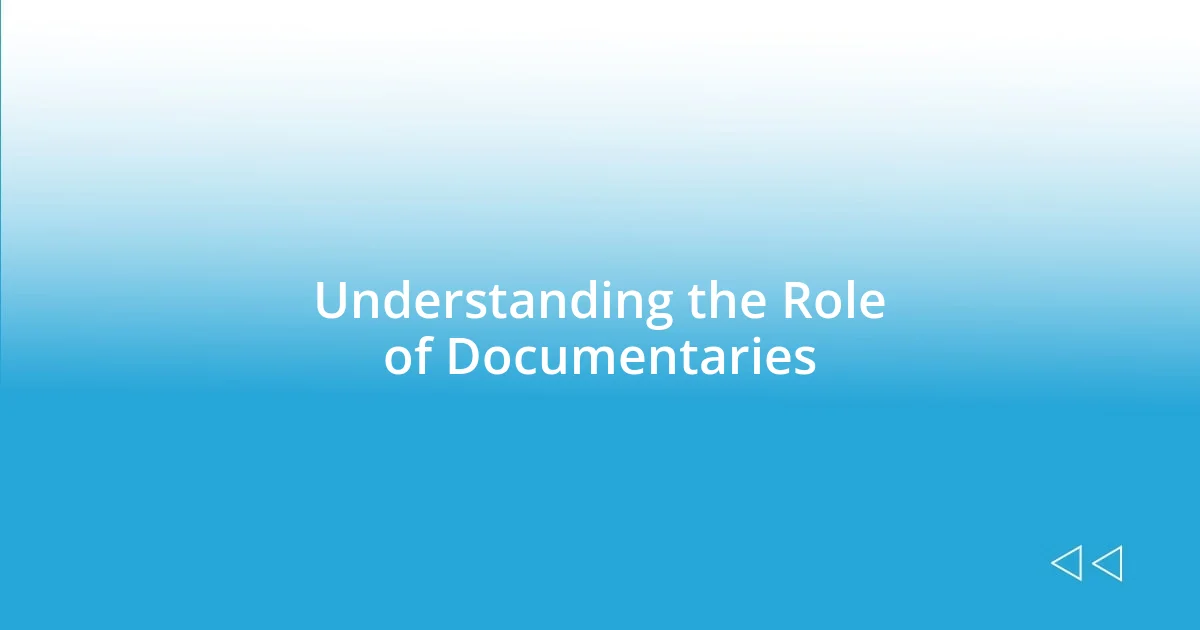
Understanding the Role of Documentaries
Documentaries serve as a powerful lens through which we can explore the complexities of history. I remember the first time I watched a documentary about World War II; it wasn’t just facts and events but stories that brought the past to life. It stirred something deep within me, making me feel a strong connection to those who lived through that tumultuous time.
What strikes me is how documentaries can distill vast amounts of information into compelling narratives. When I watched a series about ancient civilizations, I found myself captivated by the details of daily life, not just the grand events. It made me ponder: can we truly understand history if we only focus on the big moments? The smaller stories often provide the context that shapes those monumental shifts.
The emotional weight of personal stories shared in documentaries is profound. I was particularly touched by a documentary featuring eyewitness accounts from survivors of the Holocaust. Their recollections transported me to a place of empathy and reflection. It left me wondering how many other untold stories are waiting to be uncovered, just beneath the surface of what we think we know.
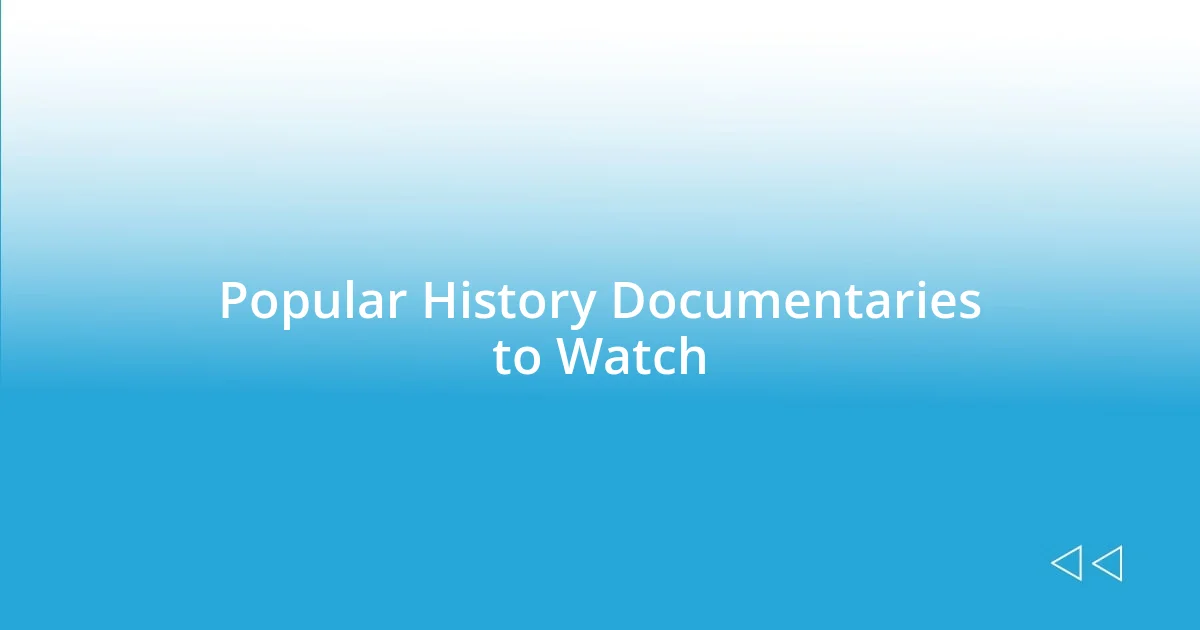
Popular History Documentaries to Watch
When it comes to popular history documentaries, one that stands out in my memory is “The Civil War” by Ken Burns. I was initially hesitant, thinking it would be dry and academic, but it was anything but that. The storytelling was so rich, using period photographs and letters to paint a vivid picture of the time, which let me feel the weight of the conflict in a deeply personal way.
Another must-watch for any history enthusiast is “13th,” directed by Ava DuVernay. It examines the intersection of race, justice, and mass incarceration in the United States. Watching it opened my eyes to systemic issues I hadn’t fully grasped before, and it sparked discussions with friends that I still treasure. How often do you find a documentary that not only educates but also inspires heartfelt conversations? This one does just that.
“Planet Earth” may seem like an environmental documentary, but it has a wealth of historical context woven throughout its breathtaking visuals. I often find myself reflecting on how human civilization has impacted our planet’s history. It reminds me of our shared responsibility in shaping the future and the historical narratives embedded in the natural world around us.
| Documentary Title | Key Themes |
|---|---|
| The Civil War | Personal stories through photographs and letters |
| 13th | Race, justice, and mass incarceration |
| Planet Earth | Impact of humanity on the environment |
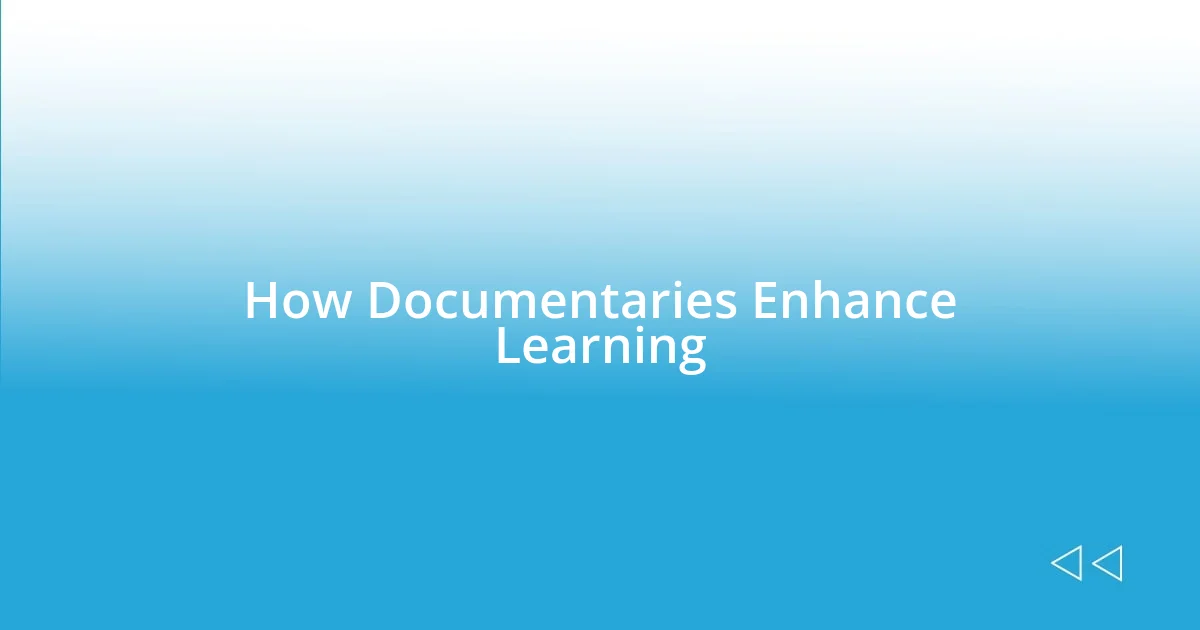
How Documentaries Enhance Learning
Documentaries do more than just inform; they create an immersive learning experience that captivates our emotions. I recall watching a documentary about the civil rights movement, and it was like stepping back in time. I felt the intensity of the protests and the unwavering spirit of the activists. This firsthand narrative approach made the history feel personal, as if I was standing alongside them, witnessing their struggles and triumphs.
Here are some reasons why documentaries excel in enhancing learning:
- Visual Engagement: They combine stunning visuals with impactful storytelling, keeping viewers engaged in a way that text often cannot.
- Emotional Connection: Documentaries frequently share personal stories, which foster empathy and a deeper understanding of historical events.
- Contextual Understanding: They present events within wider contexts, allowing us to see the relationships between different historical moments and themes.
- Varied Perspectives: Documentaries often highlight voices that may not be central in textbooks, enriching our understanding of complex issues.
- Stimulate Inquiry: They provoke curiosity and discussions, encouraging viewers to seek out more information and perspectives.
Each of these elements intertwines to create a rich tapestry of learning that resonates long after the credits roll. I often find myself sharing the insights I gain from these films in conversations, eager to explore the nuances of history with friends.
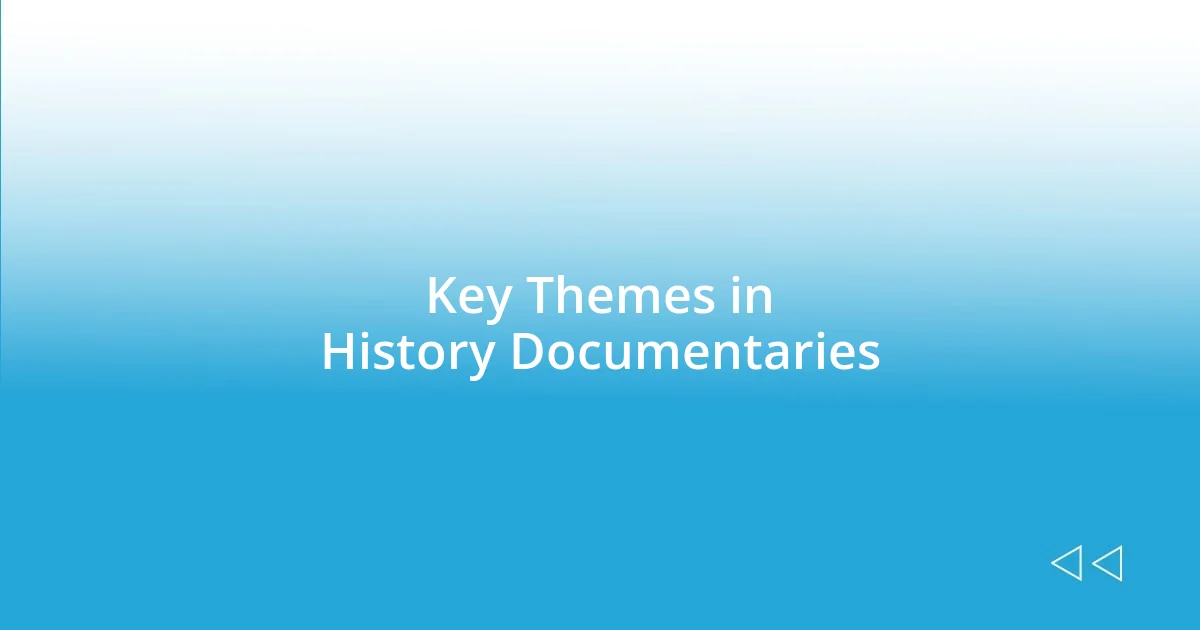
Key Themes in History Documentaries
Key themes in history documentaries often revolve around personal narratives and the universal human experience. I remember watching one documentary that focused on World War II veterans sharing their stories. Hearing their voices—filled with raw emotion and grit—made the history feel alive. It struck me how the personal details often transform events from mere dates and statistics into poignant stories that we can relate to. Don’t you feel it’s easier to grasp history when we see it through the eyes of those who lived it?
Another recurring theme is the exploration of social justice issues. Take, for example, the documentary on the Stonewall Riots. It wasn’t just about the events that unfolded but the larger cultural impact on LGBTQ+ rights throughout history. As I watched, I felt an urgent connection to the ongoing struggles for equality today. It made me ponder: how much of our current societal landscape is shaped by the battles fought by those emotional pioneers? That realization was humbling.
Lastly, many history documentaries delve into the ways our past shapes the present. One documentary on the Great Depression opened my eyes to economic disparities that resonate even now. I found it fascinating how historical context enriches our understanding of contemporary issues. It’s almost as if the past is a mirror that reflects our current challenges. Have you ever watched something that made you question how much we’ve really learned from history? That’s the beauty and power of these documentaries—they often leave us with more questions than answers, prompting deeper reflection and dialogue.
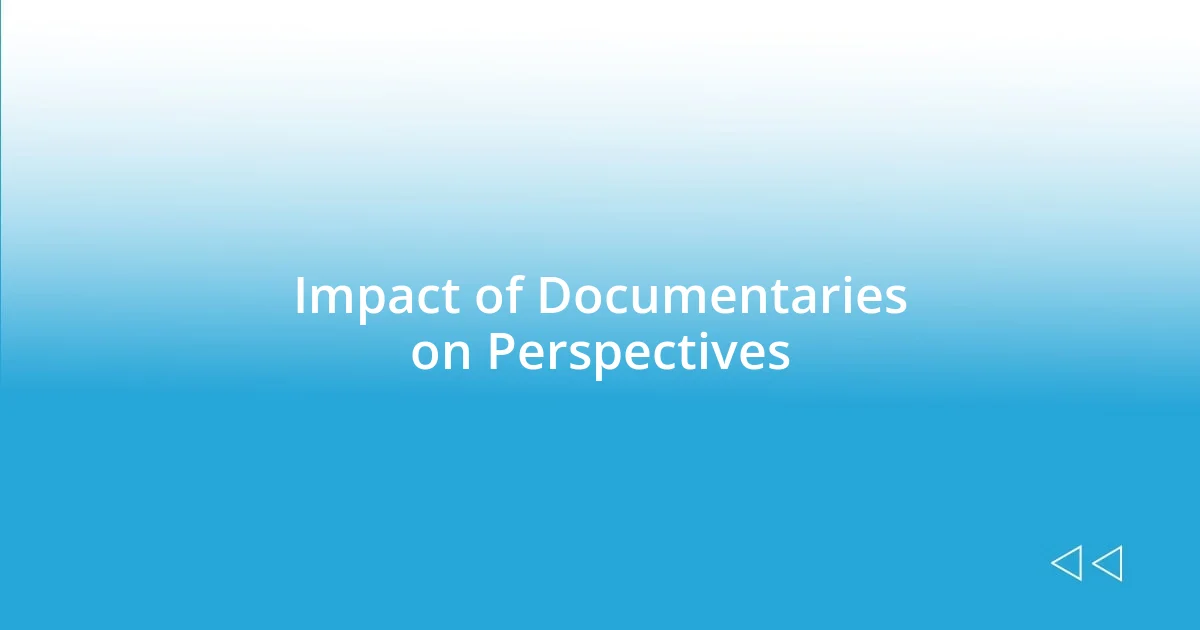
Impact of Documentaries on Perspectives
One of the most profound impacts of documentaries on perspectives is how they can challenge preconceived notions. I remember watching a documentary about Native American history. It was eye-opening to see the resilience and depth of their cultures, which are often sidelined in mainstream narratives. After that, I began to question how often we overlook the stories of marginalized communities in our collective historical understanding. Have you ever caught yourself surprised by a documentary that completely reshaped your views?
Moreover, documentaries can serve as a catalyst for emotional understanding. I felt a wave of sadness and anger while watching a film chronicling the Holocaust through survivors’ testimonies. Their stories brought me face-to-face with the human suffering behind the statistics. It made me realize that history is not just a series of events; it’s a tapestry woven with real lives. How can we truly understand history if we detach it from the human experiences that define it?
Lastly, through diverse storytelling, documentaries often broaden our worldview. I was particularly moved by a documentary focusing on the effects of colonialism in Africa. The narratives offered perspectives I had never considered, deepening my empathy towards the ongoing struggles in these regions. Afterward, I felt compelled to seek out more information about the colonial past and its ramifications. Isn’t it remarkable how one film can spark a journey of exploration? Documentaries have a unique power to ignite curiosity and foster a deeper connection with the world around us.
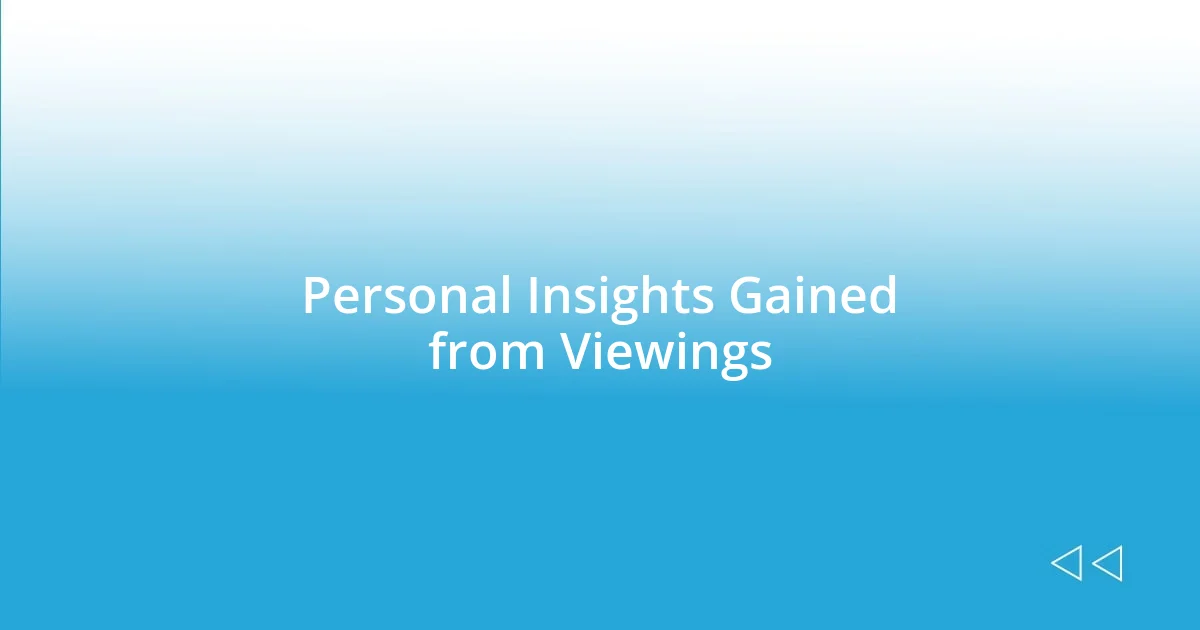
Personal Insights Gained from Viewings
Watching history documentaries has offered me a multitude of personal insights. For instance, after seeing one that featured stories from women in the suffrage movement, I felt a newfound appreciation for the struggles they endured. It’s astonishing how their determination to secure basic rights still resonates with the women’s battles today. Doesn’t it make you think about how we often stand on the shoulders of giants who fought for our freedoms?
Another experience that struck me profoundly was a documentary on the impact of the Vietnam War. The way it showcased not only soldiers but also the everyday Vietnamese civilians was eye-opening. I realized that history often narrates the tales of victors, but the lives of the forgotten deserve just as much attention. How often do we pause to consider the untold stories that live within historical events? It’s those personal narratives that enrich our understanding of humanity.
One particularly memorable viewing centered around the civil rights movement and featured intimate interviews with activists. I found myself moved, not just by their words but by the resolve etched on their faces. Their passionate fight against injustice sparked something within me, prompting a reflection on my own role in advocating for change today. Can we all afford to remain silent when the lessons of the past urge us to stand up? That’s a question I continue to ponder long after the credits roll.
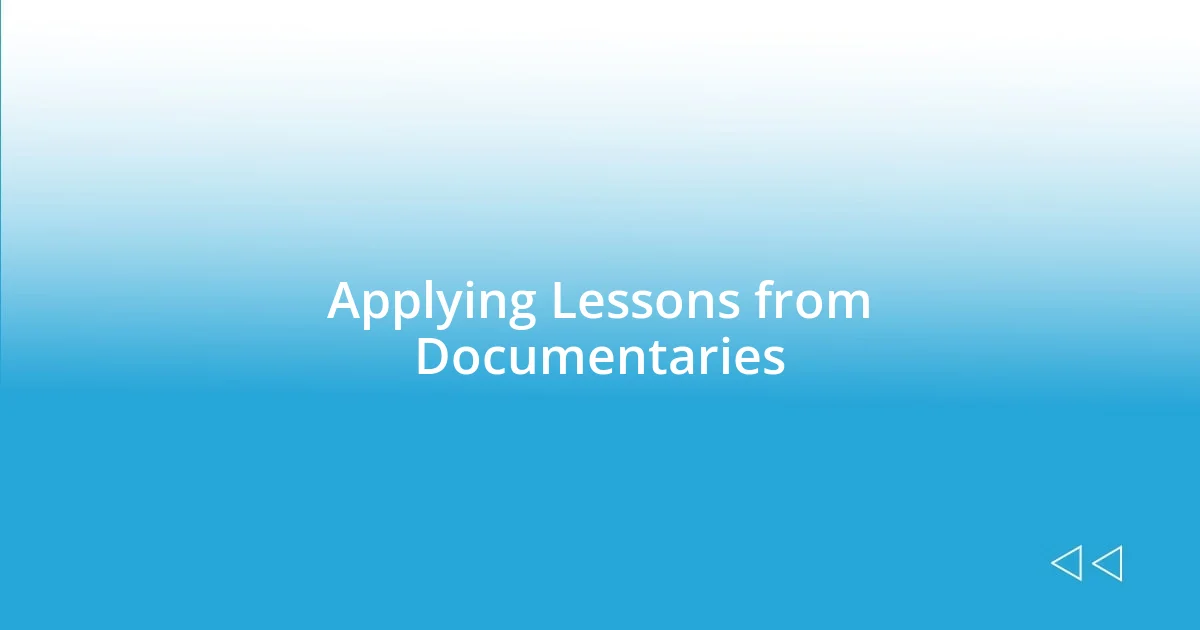
Applying Lessons from Documentaries
Applying lessons from documentaries often leads to a profound personal evolution. I remember watching a documentary about the Japanese internment during World War II. It left me feeling a mix of anger and sorrow over the injustices faced by innocent families. That experience compelled me to explore more about this dark chapter in American history and reflect on how prejudice can manifest in society. How often do we recognize the echoes of past injustices in today’s world?
In another instance, a documentary on the environmental movement showcased grassroots efforts to combat climate change. This film didn’t just inform me; it sparked an urgency within me to engage in sustainability practices in my daily life. It made me wonder—what role do I play in this global crisis? I started reducing my plastic use and supporting local conservation projects, realizing that my choices could add up to meaningful change.
Finally, an inspiring documentary about the lives of refugees made me rethink my own comfort and privilege. The bravery displayed by individuals seeking a better life was nothing short of awe-inspiring. While watching, I felt a strong desire to contribute, even if it meant small actions like volunteering or raising awareness. Isn’t it fascinating how a single documentary can resonate so deeply that it moves us to take tangible steps toward support? Those lessons transform our understanding into action, nurturing empathy and responsibility toward others.

